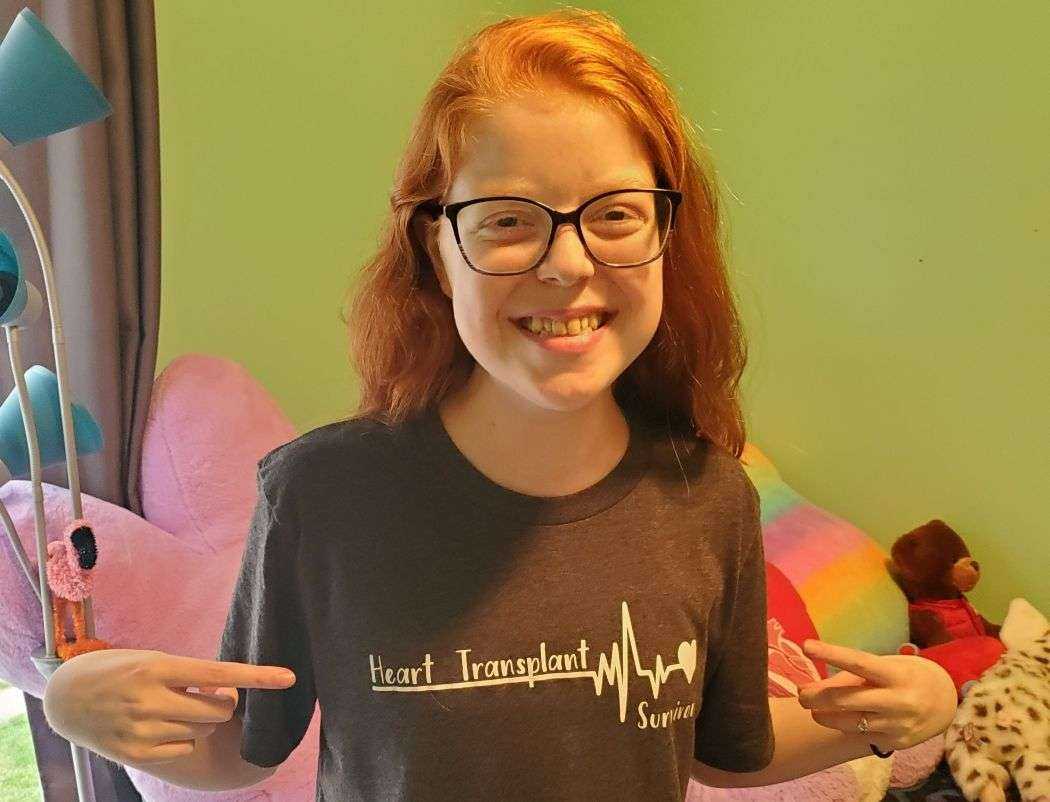Makenzie AKA Kenzie was born July 6, 2004, with a heart defect called Hypoplastic Left Heart Syndrome (HLHS). She was not diagnosed until the day after she was born. HLHS occurs when parts of the left side of the heart do not develop completely. Kenzie was taken by ambulance 18 hours after birth to Children’s Mercy Hospital of Kansas City. Kenzie has had all her surgeries at Children’s Mercy, and this is where she is waiting to receive her life saving heart transplant.
Kenzie had her first open heart surgery, known as the Norwood Procedure, when she was only 7 days old. The Norwood procedure allowed the right side of her heart to perform the functions required by both sides of a normal heart. When she was 4 months old, Kenzie had the second stage of her repairs known as the Glenn Procedure. The final procedure, known as the Fontan, was completed when she was 4 years old. The Fontan Procedure allowed her to begin living a life as normal as she could with only having half a heart.
When Kenzie was 5 years old, she started coughing up thick mucus that looked like fishing lures. After a trip to the ER, she was diagnosed with Plastic Bronchitis. Plastic bronchitis is a condition in which large, bronchial casts with rubber-like consistency develop in the tracheobronchial tree and cause airway obstruction. At first Kenzie was only coughing up casts occasionally, but she got to where she was coughing up several casts daily. The hospital decided they would try and repair her severe leaky tricuspid valve to see if that would make a difference. Kenzie had her 4th open-heart surgery at 6 years old where they placed an annuloplasty ring around her tricuspid valve. They told us after her surgery they did not expect her to survive the surgery due to the plastic bronchitis wreaking such havoc on her body. The surgery was a success and her plastic bronchitis never came back.
Kenzie had a few more bumps in the road throughout her journey. When she was 10, she went into heart failure and we thought that she would be listed for a transplant then, but after spending a few months in the ICU and changing medications she recovered. When she was 11, she started having abnormal heart rhythms called Ectopic Atrial Tachycardia, which landed her back in the hospital a few times. They put her on medication for it and she hasn’t had any more episodes since.
In 2016 Kenzie kept having major stomach issues accompanied with fevers and headaches. For 2 years Kenzie had several hospital admissions, many doctor appointments, and 2 upper and lower GI scopes. The GI doctor kept telling us that she just had IBS. Even with treatment Kenzie was not getting any better, actually she was getting worse. She had not gained any weight over the past 2 years and was severely underweight and malnourished, even though she ate large portions of food when she wasn’t in pain. Finally, after we asked if this could be Protein losing Enteropathy (PLE) the doctor ran tests and that is when she finally got the diagnosis of Protein Losing Enteropathy. PLE results in a net loss of protein from the body. In 2018 Kenzie had several PLE flair ups and that is when she was moved over to the heart transplant team. In September 2019 Kenzie was added to the list as a status 1B. Kenzie began to show a decline in health and stamina in December of 2020 and is now inpatient and listed at a status 1A on the heart transplant list.
Kenzie’s Journey with HLHS has been anything but easy, but Kenzie was born with a fighting spirit and is surrounded by a huge support system. Kenzie has a fan club at the hospital and always looks forward to when doctors and nurses that have known her since she was a baby pop into the room to say hi and talk about how much she has taught them in their career. Kenzie also has a younger sister and brother at home; she is able to facetime with them every night since, due to the pandemic, they are not allowed to visit her at the hospital.
Thank you all for the love and support that you have shown to Kenzie and our family during this journey. COTA funds will be able to help with lost income, travel expenses, anti-rejection medications she will have to take for the rest of her life, food, and any medical expenses not covered by insurance. COTA’s partnership with Kenzie and our family is for her lifetime, so COTA will also assist Kenzie with future medical costs as she transitions to adulthood. Thank you all from the bottom of our hearts for all the love and support.
The Children’s Organ Transplant Association (COTA) helps children and young adults who need a life-saving transplant by providing fundraising assistance and family support. COTA is the nation’s only fundraising organization solely dedicated to raising life-saving dollars in honor of transplant-needy children and young adults. 100% of each contribution made to COTA in honor of our patients helps meet transplant-related expenses. COTA’s services are free to our families, and gifts to COTA are tax deductible to the fullest extent of the law.

